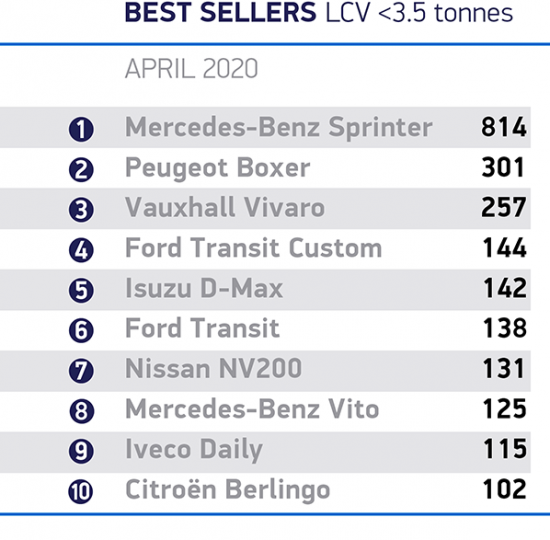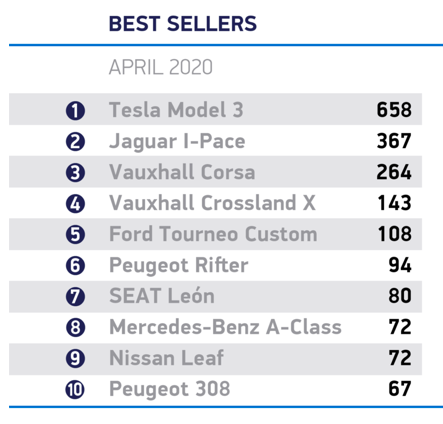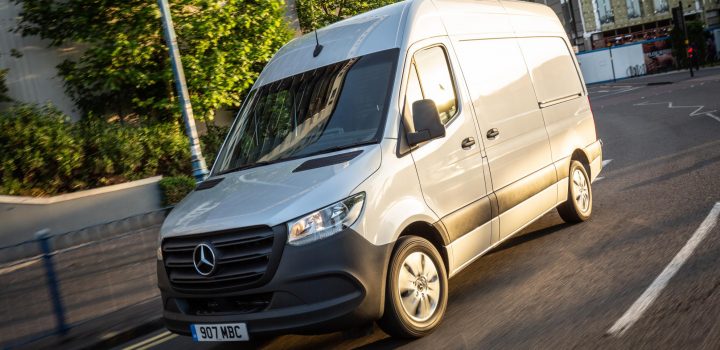A van has become Britain’s best selling vehicle during the coronavirus lockdown according to the latest figures from the Society of Motor Manufacturers and Traders.
 While the Mercedes Sprinter delivered for dealers the chaotic charts saw the pure electric Tesla Model 3 top the passenger car list, but even that couldn’t match the Sprinter.
While the Mercedes Sprinter delivered for dealers the chaotic charts saw the pure electric Tesla Model 3 top the passenger car list, but even that couldn’t match the Sprinter.
Overall, the revious low for car sales was immediately after WW2 and in February 1946 the market saw 4,044 new cars registered. It is not recorded when a van previously topped the UK sales charts.
The news comes as SMMT releases its latest new car market forecast for 2020, downgrading previous expectations to just 1.68 million registrations.
This puts the sector on course to record its worst annual performance since 1992’s 1.59 million units, below the levels seen during the financial crisis and some -27% lower than the 2.31 million new cars registered in 2019.
Despite this, the BEV market is expected to double in 2020 to 77,300 units as new model introductions bolster the market.
Mike Hawes, SMMT Chief Executive, said, “With the UK’s showrooms closed for the whole of April, the market’s worst performance in living memory is hardly surprising.
“These figures, however, still make for exceptionally grim reading, not least for the hundreds of thousands of people whose livelihoods depend on the sector. A strong new car market supports a healthy economy and as Britain starts to plan for recovery, we need car retail to be in the vanguard.
“Safely restarting this most critical sector and revitalising what will, inevitably, be subdued demand will be key to unlocking manufacturing and accelerating the UK’s economic regeneration.”
The market has completely skewed with vans outselling cars and the best selling vehicle last month was the Mercedes Sprinter Van, showing our reliance on CVs for deliveries. It also meant that Vauxhall was the best selling brand, taking 11.09% of share, perhaps not unexpected but surprisingly Jaguar came behind them with 9.16% while Ford slipped to 7.08% in third place.
It was the same story for commercial vehicles.
 The UK new light commercial vehicle (LCV) market declined -86.2% in April as nearly all registrations stopped due to coronavirus lockdowns. According to the latest figures released today by the Society of Motor Manufacturers and Traders (SMMT), just 3,387 LCVs joined UK roads in April, 21,217 fewer than in the same month last year.
The UK new light commercial vehicle (LCV) market declined -86.2% in April as nearly all registrations stopped due to coronavirus lockdowns. According to the latest figures released today by the Society of Motor Manufacturers and Traders (SMMT), just 3,387 LCVs joined UK roads in April, 21,217 fewer than in the same month last year.
Demand for smaller commercial vehicles was hit badly, with just 271 pickups registered in April, down -91.8%, while vans weighing 2.0 tonnes or less saw a -92.3% decline and registrations of mid-sized vans weighing more than 2.0-2.5 tonnes fell -90.4%. Meanwhile, demand for larger vans weighing more than 2.5-3.5 tonnes was down -83.1%, with 2,588 vans delivered to operators, many of them working on the front line of the national crisis.
Sue Robinson, Director of the National Franchised Dealers Association, which represents franchised car and commercial vehicle retailers was concerned.
New car sales declined by 97.3% in April with 4,321 units registered. Year to date, the market is down -43.4%. In April, fleet orders took a market share of 71.5%. Year to date, sales of battery electric vehicles and plug-in hybrid electric vehicles remain above last year’s levels, she said.
Robinson continued, “Despite these figures, many franchised dealers continued to deliver aftersales service to key workers and the industry is now working hard to enable trading to restart with all necessary measures in place.
“NFDA has been talking to the relevant Government departments and manufacturers to ensure work can commence safely for the benefit of dealerships’ staff and customers.
“Over the coming months, it will be vital to evaluate a support package that stimulates the market and ensures the long-term stability of a sector which is key to the UK economy and provides employment to thousands of people”.
 James Fairclough, CEO of AA Cars, added, ““Between March and April, new car sales slowed from a crawl to a snails’ pace. At 44% down on the same month a year ago, March’s drop in sales was mitigated by two weeks of fairly normal activity before the imposition of the lockdown.
James Fairclough, CEO of AA Cars, added, ““Between March and April, new car sales slowed from a crawl to a snails’ pace. At 44% down on the same month a year ago, March’s drop in sales was mitigated by two weeks of fairly normal activity before the imposition of the lockdown.
“But April’s 97% year-on-year decline is unsurprisingly far more significant, with car dealerships closed across the UK.
“The industry’s eyes are firmly on the Government’s next move, with dealers watching closely for any sign of an easing of the restrictions or further support for businesses forced to close.
“The big question is what will demand from consumers be like when dealerships are allowed to reopen? Various commentators have questioned whether some of those who usually commute by public transport may be planning to buy a car for when they return to work so they can continue social distancing.
“Those consumers who are in the market to buy a new car when the lockdown period ends may find there are some very competitive deals and offers available to facilitate their purchase. However, at the same time, it is unclear whether the same levels of credit will be available to potential customers who want to use car finance options. Lenders committing to continue offering finance to new customers will play an important role in allowing sales to recover.
“For other consumers, a new car purchase will now understandably be much lower down on their priority list – especially for those struggling with direct economic consequences of the pandemic, or those with reduced job security.
“Down the line, there are likely to be calls for the Government to offer additional incentives to get people buying new cars again. This stimulus could be combined with the UK’s Carbon Zero goals, and some in the industry believe we could see a scrappage scheme which simultaneously incentivises the take-up of environmentally-friendly vehicles.
“For the moment, all the industry can do is sit tight and wait for the news that forecourts can open again.”
Seán Kemple, Director of Sales at Close Brothers Motor Finance, went on, “Though they’re drastic, April’s figures come as little surprise to the motor industry. With the economy ground to a halt in light of Covid-19, new car sales have simply been put on hold. The motor industry will pick up speed, but there is a bumpy road ahead as we drive toward pastures new.
“When the lockdown does begin to lift, we should see pent-up demand released, triggering a sharp rise in sales of the cars sitting in showrooms; we’ve already seen this in the European used car market as dealers review and reprice their stock after lockdown. But after an inevitable uplift, the future is less certain.
“We might start to see supply issues, held up by restrictions on manufacturing and the stalling of overseas shipment. In the longer-term, demand trends may change. We know that in times of economic hardship, buyers often shift from new to used cars in order to get their hands on a more affordable vehicle. An appreciation for the greener world caused by lockdown may prompt a rise in AFV demand, or low oil prices could bolster the diesel market. More broadly, a newfound reticence to use public transport might boost demand for private cars.
“Dealers will need to keep their fingers on the pulse throughout the rest of the year. While uncertainty will persist, the strength of the industry will rise to the challenge. We are already seeing the likes of Volkswagen reopening factories under social-distancing rules, and the creativity of a sector adapting to new circumstances will continue to shine.”
Figures from USwitch show internet usage soared 29% last month, reflecting home working, home schooling and online shopping as well as family and friends communications.
Alex Buttle, director of car selling comparison website Motorway.co.uk, observed, “Rather than dwelling on these woeful April figures, it’s more important to address the future and what realities the car market is going to face when full production resumes.
“It’s not just the economic landscape that is going to look different when restrictions are lifted. The way people go about their day to day business is going to change forever, and car dealers, as indeed all businesses, will need to adapt.
“Social distancing measures are likely to be a part of our lives for some time, and even with restrictions eased, new car dealerships will need to adapt to offer a more contact-free experience for customers.
“We expect to see an acceleration in digital car sales with manufacturers giving customers better tools to build and view cars online without having to physically visit a showroom.
“Although it’s unlikely manufacturers will be able to offer huge price drops, we can expect to see a range of incentives being offered to customers to encourage them to buy new cars again.
“The industry is well aware it can’t stick its head in the sand – it will need to accept the new realities of a post coronavirus Britain. The trading environment for new cars will be tough for a while.”
|
What of the future? Rupert Pontin, Director of Insights, Cazana, suggested, “Retail prices have continued to shift during the last week as a spark of confidence and activity begins to return to the UK automotive sector. “There is little doubt that the retail consumer is continuing to look at vehicles online and there are more examples of cars being sold and now actually delivered as well whilst the dealer sector seeks to ensure they are in a position to address the upcoming return to proper market activity as the country prepares to come out of lockdown. “Verbal discussions with the larger dealer groups suggest that many, but not all, are capable of ensuring customers can buy online with confidence that their new car will be delivered safely. The increase in the number of dealers now capable of providing the full online journey from enquiry, through remote or socially distanced viewing and the finance process is generally impressive given the current circumstances.” The government is now due to make an announcement on 10 May indicating how they will begin to bring the UK out of lockdown and this is exciting news for every person in the country. The important thing is to avoid a second wave of infections and for the automotive sector, a U shape dip in the market performance for the year will be the best outcome possible. However, it is worth noting that the original confidence in used car activity experienced in the Chinese and German markets seems to have waned a little and the UK would be wise to learn from the experience of other countries. With retail pricing still moving and stock beginning to sell, the realisation that vehicles will need to be replaced is beginning to strike home and therefore market wide pricing drops are looking increasingly unlikely, he concluded. |
Steve Bridge, Managing Director, Mercedes-Benz Vans UK said it was committed to keeping customers moving, especially when they need them the most.
He added, “We are now P1 in the Large Van segment with an incredible 43% market share in April in Large Van. In fact, the Sprinter was the highest selling motor vehicle in April, surpassing all passenger cars in the market, which comes as little surprise when you see how many vans are currently on the roads with the Mercedes-Benz Star on the front, from supermarket deliveries and pharmaceutical vans, to parcel couriers and, of course, ambulances. We are extremely proud to have served the front line during these challenging times. “An incredible 97% of Mercedes-Benz Vans Dealer groups remained safely open for key workers and industries in April, and all but four Dealers registered vans in the month when most of our competitors were shut – a remarkable achievement. “In terms of the hard-working workshops across the Network, labour hours have been record-breaking for every month this year, topping the previous year without fail. “Parts sales were only down -53% on last April, which has meant we have been able to ensure our customers remain on the road and doing the important jobs that keep the country moving.” |


